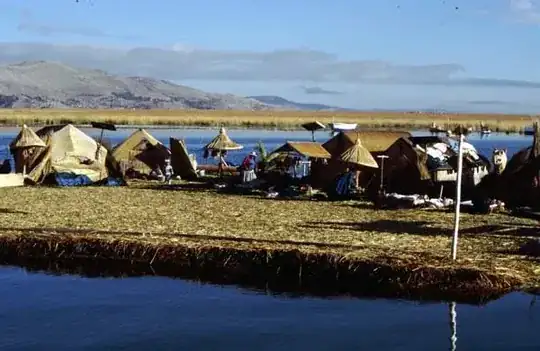All of the methods I can think of that would cause some portion of land to rapidly become an island without involving massive tectonic or volcanic upheavals or meteoric impacts involve something like a flood, storm, or river outbreak partitioning off the end of a peninsula. But none of those would actually move the land, just remove connecting lowlands to leave it separated. So, that leaves us with divine intervention. As to how the people onboard would fare, it really depends on how fast they're going and how the deity is moving them.
Let's look at the speed first. You ask for movement across an ocean within a human lifetime. For the sake of having some numbers to play with, let's say we need to move 2000 miles (roughly the width of the Atlantic between Brazil and Western Africa) in 50 years. That's ~40 miles a year, ~580 ft/day, or ~24 ft/hr.
All things considered, that's not actually very fast, assuming it's a steady movement. Last month, New Zealand suffered a magnitude 7.8 earthquake. During the earthquake, a portion of one of the faults moved 33 feet in the space of two minutes. That's about forty times faster than the 0.4 ft/min we need to maintain for our journey, which tells me that we're not quite working at a "catastrophic earthquake" level of earth-movement, unless it's moving in fits and starts as opposed to maintaining a constant rate of movement. This leads to questions about our motive force.
If the deity moving the island is physically shoving a mountain across the bottom of the ocean, with all the grinding and friction that implies, that is going to build up a lot of frictional heat, and also effectively cause a continuous low-level earthquake on the island. If it's not able to maintain a steady movement, but rather moves it in shorter bursts between rest periods, that will dramatically increase the earthquake magnitude involved. But it's changes in the movement (acceleration) that are felt more than the rate of movement. Once the island is up to speed and moving steadily, the ride will smooth out laterally, even if there's some up-and-down bumps due to unevenness on the seabed. It's stopping and starting (or otherwise changing speed) that will cause the strongest shocks.
However, you already have a deity moving the island. For the purposes of your story, it can also soften/liquefy the base of the island as part of moving it, so that the island basically "skates" across the ocean floor rather than grinds. This would dramatically reduce friction and heat produced, and also reduce the rumbling/shaking felt on the surface. Picture an ice cube sliding across a tabletop for what I'm talking about. As a "natural" process, this would slowly eat up the base of the mountain/island and cause it to sink, so divine intervention would be needed to explain why that didn't happen.
At the rate of motion implied, there isn't any tsunami danger. Assuming the motion is steady, real-world currents already move much faster than the island is--if the current around the island is flowing in the direction of the island's movement, it would actually be pushing the island forward. (Heck, this could actually be part of the story -- the deity of the earth loosens the island so that it can move, and the deity of the ocean pushes it where it needed to go with its current.)
As for the inhabitants, the people on the island are probably due for a rough time, since they'll basically be dealing with a constant mid-level earthquake for fifty years. It's not ideal, but mankind is adaptable, and they'd make it work. Tents or single-level wooden structures that can flex with the motion would rapidly become the dominant architectural style. Stone walls would be kept low (e.g. boundary walls) and would need to be carefully engineered if used, and stone or heavy-timbered roofs would probably be considered a bad long-term idea, even if they were strongly built to begin with.
Water travel around the island shouldn't be an issue; like I said earlier, the rate of motion of the water around the island is going to dominate the currents around it unless it'd be otherwise completely calm, so navigation around the island won't be harder than around a normal island. The exception is that long-distance voyages wouldn't be recommended, unless you're certain that you know what course the island is moving in. Shorter trips up to a week or two shouldn't be a big problem as long as the weather remains clear -- the island's moving less than a mile a week, so as long as there's any reasonable promontory on it, it should be visible on a clear day from your departure point.
Honestly, what might be the bigger issue is the population relative to the size of the island. It's entirely possible that the resources of a small island could be depleted before the journey is complete. Fresh water especially could become a problem, if groundwater is disrupted and not replaced with sufficient quantities of rainwater. Again, divine intervention may be required. I'd suggest looking at modern-day Pacific islands to get an idea of what size island can support what size population long-term.
TL:DR - Try to do it via real-world methods and destroy your planet and everyone on it. Get a deity to move your island at a slow, steady, even rate, and you should be fine. Your sustainable population is probably about the same as any normal island, assuming a reliable water supply.
